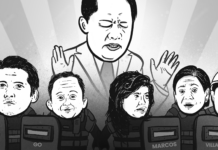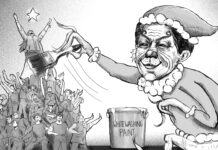ACCUSING Justice Secretary Leila de Lima of being behind the criminal complaint filed by expelled Iglesia ni Cristo (INC) minister Isaias Samson Jr. against the INC leadership for alleged illegal detention, tens of thousands of the sect’s members took to Edsa and surrounding streets to demand that the case be withdrawn, that De Lima stop meddling in the affairs of the INC, and for the government to respect the separation of church and state.
The 1987 Constitution provides that the “separation of church and state shall be inviolable” and “no law shall be made respecting an establishment of religion, or prohibiting the free exercise thereof. The free exercise and enjoyment of religious profession and worship, without discrimination or preference, shall forever be allowed. No religious test shall be required for the exercise of civil or political rights.”
The separation clause is actually an expression of the secular republican rule that the state cannot establish its own religion. “Non-establishment of religion” is therefore a rule against the state, not against religion.
The prohibition is one-sided, yes. This is because while the state has police and taxing powers, religion has none. Having powers, the state has the tendency to abuse them, which is historically proven by the Reign of Terror that followed the Fall of the Bastille, Napoleon’s excesses, the Mexican torching of the churches, the anti-Christian persecutions that triggered the Spanish civil war, and even the raid of convents and abuse of religious during the Marcos dictatorship.
But is the state abusing its powers and bullying the INC—and perhaps favoring other churches over the INC—when it accepted the criminal complaint of an ex-minister of the INC on his alleged detention in the hands of the sect’s leaders?
No. In the first place, the complainant is not anymore an INC member—he was kicked out in fact by the church elders after he, along with other ministers, including estranged kin of the INC “pope” himself, complained they were being held against their will by the INC leadership.
Although the INC leaders denied that the ex-minister and the others were detained, they did not deny that an internal conflct was brewing. This was very obvious to everyone in the country, especially since the Philippine National Police (PNP), headed by an official recommended to the post by the INC, suspiciously set a detachment to bar the gate of the house where the estranged relatives of the INC head minister, Eduardo Manalo, were holed up in, apparently to stop them from getting out and talking to the press. News TV cameras showed the policemen stopping food deliveries to the house, and it took an officer from the Commission on Human Rights to stop the apparent harassment and human rights violation by the PNP. Of course, the PNP, headed by someone said to be an INC ally, explained that the police were merely protecting the household staff–but from what? From food deliveries? Obviously for the PNP to have raised the possibility of danger should impress everyone–including law enforcers and justice authorities–that something was amiss.
In any case, it should be up to De Lima and the Department of Justice to determine if there was basis to the complaint. That is their duty.
Civil Law Dean Nilo Divina said it is only proper for the state to accept the complaint and start the process for its resolution.
“While the state cannot intervene in purely religious affairs, it cannot close its eyes to clear violations of the law pretending to be in the guise of purely religious affairs,” he explained in an email to the Varsitarian.
To be sure, it appears that during the rally, which paralyzed traffic in Edsa, it was government that kowtowed to the INC, with many politicians making political hay by expressing their agreement with the strange logic of the INC elders, and generally winking at them to support their base political aspirations.
The INC generally votes as a bloc and in many close contests, their vote, however small, could be decisive. So perhaps for the state–and its bevy of politicians–the INC has earned the right to “meddle” in state affairs.
But the INC overkill should be welcomed if only for the fact that it gave the state a dose of its own medicine.
Whenever Catholic leaders criticized government policies, laws or initiatives—logging, mining, reproductive health, agrarian reform, free-market capitalism—they are always accused of violating the separation of the church and state.
The accusation is generally levelled at the clergy and the bishops, as if their ordination to holy orders generally put a stop to their Filipino citizenship.
Likewise Cafeteria Catholics apply the logic of the cafeteria to the bishops, nuns and clergy: when Cardinal Sin and the episcopal conference criticized Marcos and condemned human rights abuses, they welcomed them. But when they opposed contraception, abortion, sex education, population control, and capital punishment, they accused the clergy and religious of violating the separation of church and state.
Cafeteria Catholics–and the state and its statist liberal champions–should be reminded that while bishops and clergy obviously employ the resources of their theology and thus, religion, in discerning social and political issues, they start off with something more basic—natural law, human rights and the dignity of the human person. When she condemns state policies, laws, and initiatives for their injustice or danger, the Church hierarchy doesn’t exactly invoke the Bible or God’s law, but natural law, the law written in the hearts of men. For example, the Church’s opposition to contraceptives is due to the fact they have by and large harmful side effects to women who use them, if not that they are harmful to the unborn since many of them are really abortifacients. To kill or put someone’s health and life is against the natural law. That is very obvious to everyone even without a working knowledge of the Bible.
Moreover, the Church knows whereof she speaks. She puts her money where her mouth is.
When Church leaders oppose the distribution of condoms to check HIV/Aids and of contraceptives that are actually abortifacients, cafeteria Catholics and politicians condemn them, ignoring the fact that the Catholic Church runs the biggest health care system in the world that ministers to many pregnant women and HIV sufferers especially in the Third World.
Cafeteria Catholics and the state are kindred fellows: by their reductionism and capriciousness, they basically establish their own religion, like the INC perhaps, which they favor over the Catholic Church.
And then they have the gall to accuse the Catholic Church of violating the separation of church and state!













